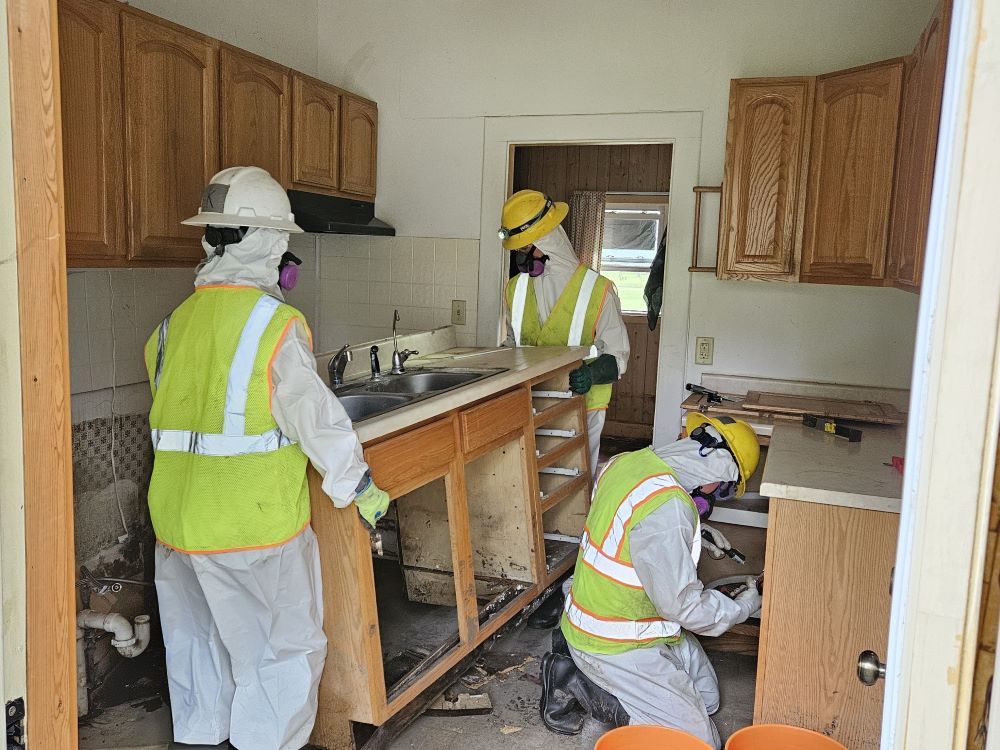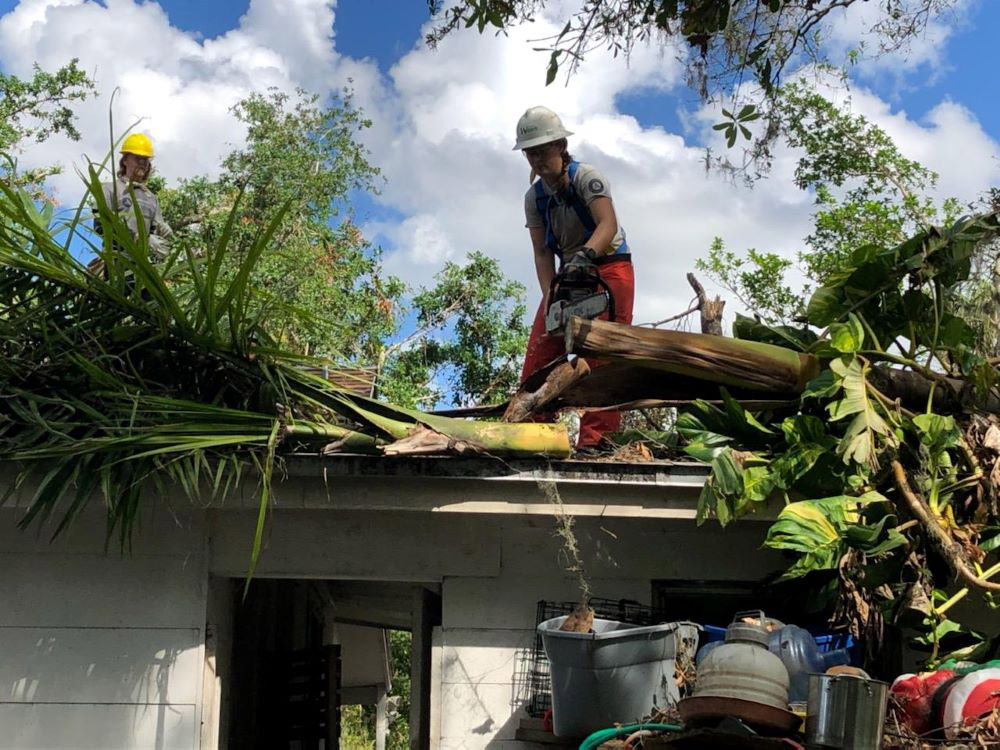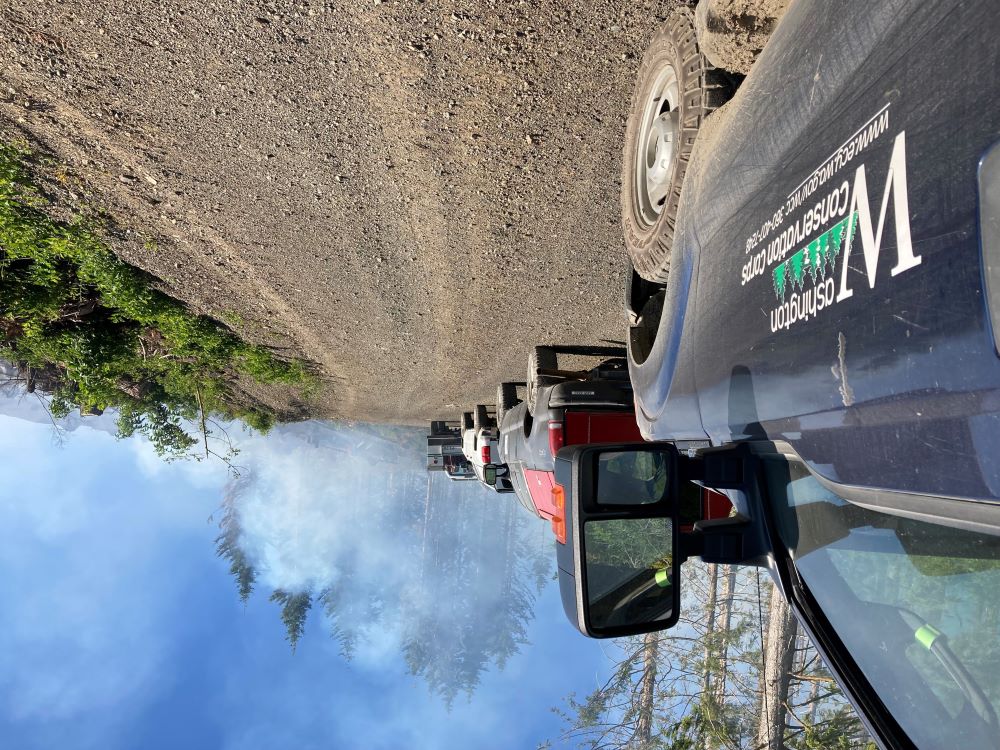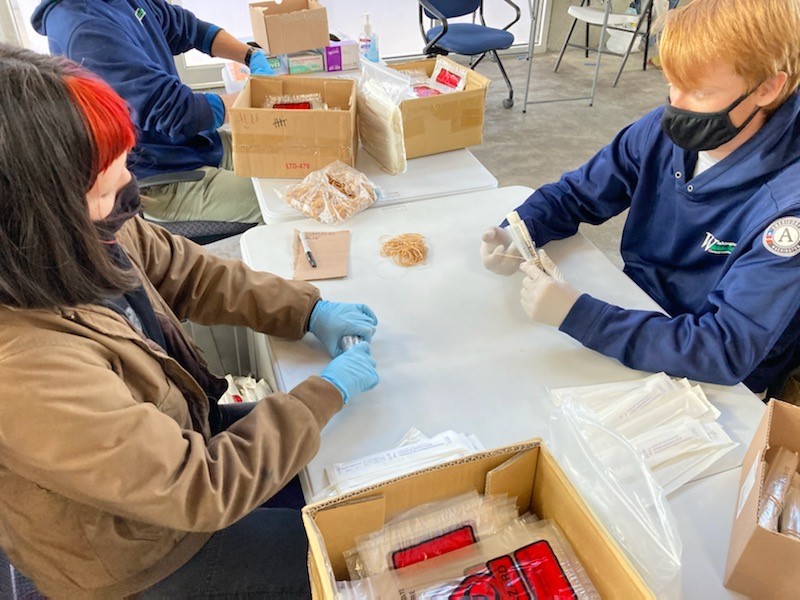WCC disaster response
Local response
WCC crews many be available to support local disaster response efforts in Washington. Requests for WCC assistance must be routed through the city or county emergency management office.
Washington Conservation Corps supports communities affected by disasters such as wildfires, floods, hurricanes, tornadoes, earthquakes, landslides, oil spills and hazardous material releases. We deploy trained members and staff when disasters strike.
Life on disaster response
Responding to disasters is a challenging assignment, often involving long hours, extreme weather, limited food options, and makeshift accommodations. Despite these conditions, serving on disaster response directly supports communities in need, making it a rewarding and memorable experience.
Our members support disaster responses on a voluntary basis. WCC has four designated disaster response crews, which are first to be called when the need arises. However, members in any position can express interest in being deployed. Disaster response opportunities vary from term to term.
Some deployments may be as short as a week, while other deployments may last up to 30 days. WCC covers food, lodging, and transportation costs for our members during deployments. Lodging is often in makeshift locations such as campgrounds or community centers.
While deployed, WCC members serve with other response groups from around the country. We frequently respond alongside other corps programs and interface with responders from government agencies, nonprofit organizations, and community groups.
Deployment projects vary depending on the nature of the disaster. Tasks may include removing hazardous trees, deconstructing interiors of water damaged homes (muck and gut), completing damage assessments, setting up camps or shelters, installing sandbags, sorting supplies and donations, building fire lines, and more. WCC provides all the necessary training and tools for our members and staff to safely complete response projects.
Past deployments

WCC members remove water-damaged cabinetry from a home after floods in northwest Iowa.
Flooding
Washington
In any given year, there is more than an 80% chance that Washington will experience 10 or more flood events. Our crews are stationed across the state and can respond quickly when flooding strikes.
In fall 2021, WCC helped flood response efforts in Skagit and Clallam counties. In Mount Vernon, two crews deployed to help community volunteers fill sandbags to construct a 20-foot-long temporary wall to protect local railroad tracks. In Forks, one crew removed damaged materials from homes affected by floodwater and prepared the structures for mold treatment.
In 2018, 37 WCC members supported communities in Okanogan and Pend Oreille counties as the region experienced the most severe flooding in more than 40 years. Crews acted quickly to keep floodwaters out of homes by filling and placing sandbags and organizing and loading supplies at the response’s base camp.
Iowa
In August 2024, WCC deployed 20 members and staff to Okoboji, Iowa, after historic high waters flooded communities in the northwest region of the state. WCC, alongside other AmeriCorps Disaster Response Teams:
- Completed 94 damage assessments
- Cleared 54 homes and structures
- Removed 796 cubic yards of water-damaged debris
In 2019, WCC deployed 13 members and staff to Shenandoah, Iowa, to support communities after the Missouri River swelled to more than 30 feet near Council Bluffs and breached over 40 levees. Read a member-written blog about their experience deploying to Shenandoah.

A WCC supervisor removes a hazard tree from the roof of a home near Fort Meyers, Fla.
Hurricanes
Hurricanes Helene and Milton
During our 2024-25 service term, WCC participated in two 30-day deployments following back-to-back hurricanes in the southeast United States. In October 2024, 30 staff and members deployed to St. Lucie County, Fla., to muck and gut homes and structures after Hurricane Milton swept through the region. A few months later, 20 members and staff deployed to Asheville, N.C., in January 2025 to help with the response to Hurricane Helene. They removed nearly 800 cubic yards of debris and more than 40 hazardous trees from homes and properties affected by the storm.
Hurricane Ian
In October 2022, WCC started our service term by deploying 26 members and staff to Fort Myers, Fla., to support communities impacted by Hurricane Ian. Crews spent four weeks in the hardest hit locations — Charlotte, Collier, DeSoto, Lee, and Osceola counties — removing water-damaged materials from homes and structures.
Hurricanes Harvey, Irma, and Maria
During our 2017-2018 service term, WCC embarked on the largest deployment in our history after hurricanes Harvey, Irma and Maria all made landfall. After an unprecedented request for help from the Federal Emergency Management Agency, WCC deployed two-thirds of our program members and staff to Texas, Florida, U.S. Virgin Islands, and Puerto Rico to assist communities after these devastating hurricanes. In response, WCC and AmeriCorps Disaster Response Teams:
- Mucked and gutted 611 homes and structures
- Cleared 53,979 cubic yards of debris from homes and yards
- Temporarily repaired or installed tarps on 544 roofs
- Sorted 132,713 pounds of donations
- Removed 2,284 trees posing safety hazards

A WCC truck approaches the site of the 2021 Mount Washington fire.
Wildfires
WCC regularly supports wildfire relief efforts across Washington. Members can earn their Incident Qualification Card, commonly known as a “Red Card,” during our training weeks and may have opportunities to gain hands-on experience in active wildfire response and camp help.
In 2024, WCC deployed one crew to the 2620 Road fire camp near Brinnon, where they ensured the camp ran smoothly by sorting supplies, cleaning up after meals, and filling potholes. In 2021, WCC responded to active wildfires near Gunderson Road, Mount Washington, and Pleasant Valley.
The 2015 wildfire season was one of WCC’s busiest. We deployed 150 members and staff to respond to 26 wildfires across Washington — a total of 26,064 hours of service. Read a nationally published member-written blog post from the 2015 fire season.

WCC members assemble Covid-19 test kits.
Other responses
Covid-19
WCC members embarked on several unique local deployments in response to the Covid-19 pandemic. In 2020 and 2021, WCC staff and members set up nearly 300 beds in field hospitals in King County, assembled more than 50,000 Covid-19 test kits, and deployed to vaccine distribution centers in Benton, Chelan, and Spokane counties to screen community members, direct traffic, and enter data.
Oso Landslide
After a devastating landslide engulfed the unincorporated community of Oso in Snohomish County in 2014, WCC rallied to support response efforts in Arlington, Darrington and Oso — deploying 83 AmeriCorps members and 25 staff for more than a month. WCC crews served more than 18,500 hours in the communities.
Related links
Contact information
Disaster response coordinator
Vanessa Lott
360-594-7469

